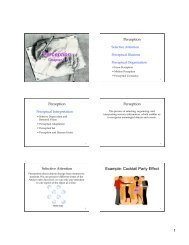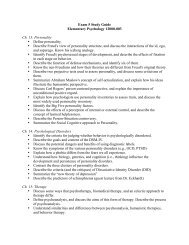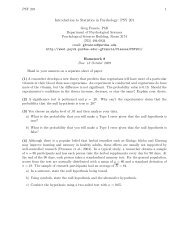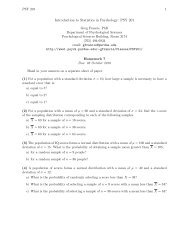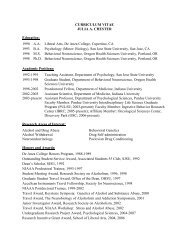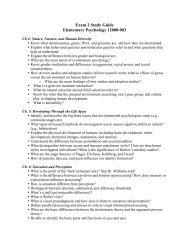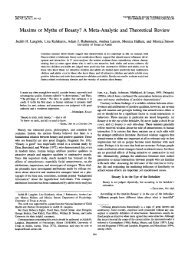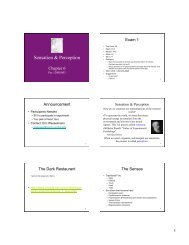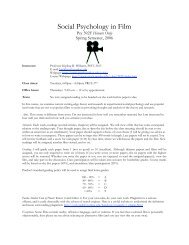Introduction to Cognitive Psychology - Department of Psychological ...
Introduction to Cognitive Psychology - Department of Psychological ...
Introduction to Cognitive Psychology - Department of Psychological ...
You also want an ePaper? Increase the reach of your titles
YUMPU automatically turns print PDFs into web optimized ePapers that Google loves.
Pr<strong>of</strong>essor Greg Francis 8/14/12Word rulesMorphologyPart <strong>of</strong> linguistics identifiesthe rules for working withwords (morphology) Show this page <strong>to</strong> apreschoolerThe child will say wugseven though he has neverseen a wug before This implies that there mustbe a rule for pluralizing nounsThe rules <strong>of</strong> word formationIn many respects English has a verylimited morphology nouns have two forms verbs have four formsduckducksquackquacksquackedquackingPurdue UniversityPurdue UniversityMorphologyOther languages have many morevariations Italian and Spanish have 50 forms <strong>of</strong> each verb classical Greek has 350 forms <strong>of</strong> each verb Turkish has 2 million forms <strong>of</strong> each verb some languages build entire sentences aroundone complex verbThere are rules for these formsPurdue UniversityMorphologyEnglish can convey this information in as many waysas other languages, but we use grammatical phrases<strong>to</strong> do soSimple present tense General truths: Ducks quack. Habitual action: I quack like a duck when I wake up.Present Perfect Progressive To express duration <strong>of</strong> an action that began in the past, hascontinued in<strong>to</strong> the present, and may continue in<strong>to</strong> the future:The duck has been quacking for two hours, and he hasntfinished yet.Other languages have different verb forms <strong>to</strong> indicatethese conditionsPurdue UniversityMorphologySuffixesOn the other hand, English morphologyallows one <strong>to</strong> easily create new wordsfrom old words add suffixes and prefixesteachteachableteacher unteachable teachablenessEnglish has lots <strong>of</strong> these derivational suffixes-able-age-al-ate-ed-en-ify-ion-ish-ize-an-ant-ance-ary-er-ful-hood-ic-ism-ist-ity-ive-ness-ory-ous-yExamples<strong>of</strong> morphemesYou probably donot consciously knowwhat some <strong>of</strong> thesemean, but yourlanguage system does.Purdue UniversityPurdue UniversityPSY 200: Intro. <strong>to</strong> <strong>Cognitive</strong> <strong>Psychology</strong> 2


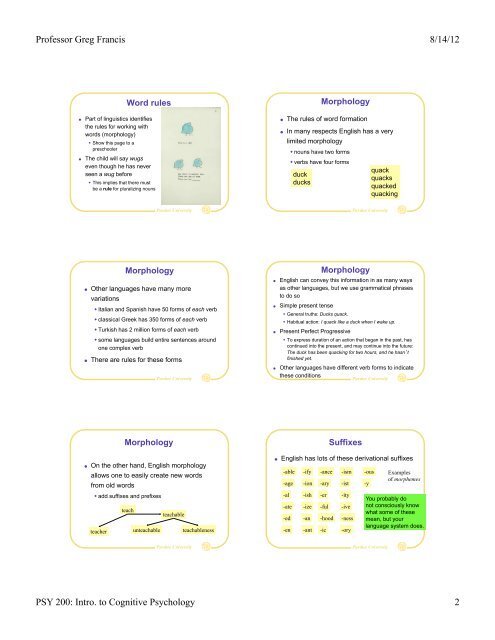


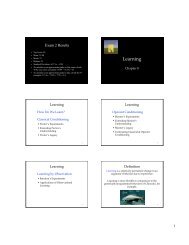
![Exam 4 Study Guide[1]](https://img.yumpu.com/45196739/1/190x245/exam-4-study-guide1.jpg?quality=85)
